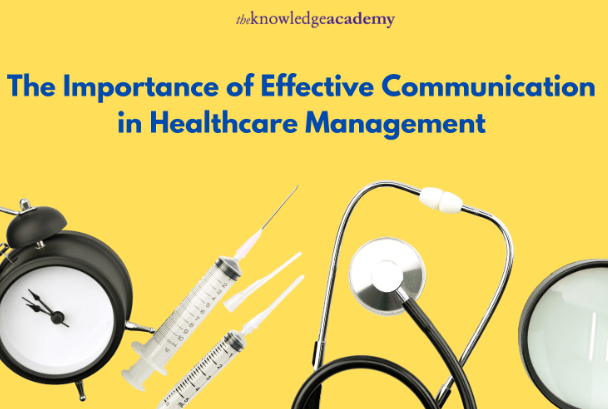The Importance of Effective Communication in Healthcare Management

Good communication is the glue keeping things together in today’s hectic healthcare field. Imagine a hospital where everyone, from doctors and nurses to the administrative staff, collaboratively ensures patients receive the finest treatment. That’s the magic of excellent communication! Management Training Courses change everything by guiding medical professionals towards mastery of these abilities. These courses enable leaders to lower mistakes, increase patient happiness, and simplify processes. Therefore, communication is crucial for Healthcare Management whether for team coordination or patient contact.
Table of Contents
- Clear Communication
- Building Trust and Rapport with Patients
- Enhancing Team Collaboration
- Building Communication Skills
- Overcoming Communication Barriers
- Conclusion
Clear Communication
In healthcare management, effective communication goes beyond just talking and listening to ensure the correct information is communicated to the correct individuals at the correct moment. This includes textual and digital contact as well as spoken and nonverbal communication. Accuracy and clarity are critical in medical environments where the stakes are quite high. Errors in diagnosis, treatment, and patient care resulting from miscommunication can have grave, even deadly effects.
Consistent protocols and procedures are one of the main components of efficient healthcare communication. These rules guarantee everyone agrees and hence lowers the possibility of mistakes. For example, handoff communications—those in which one healthcare provider passes patient responsibility to another—are pivotal events in which exact information transmission is crucial. Often, structured communication strategies such as SBAR (Situation, Background, Assessment, Recommendation) help guarantee that important information is delivered precisely and simply.
Building Trust and Rapport with Patients
A solid patient-provider relationship is built upon effective communication. Patients who feel heard and understood are more likely to trust their healthcare professionals, enhancing their adherence to treatment regimens and resulting in better health outcomes. Regardless of patient background or degree of medical expertise, effective communication entails active empathy and the ability to present material in a manner that makes sense to them.
A doctor who takes the time to clearly explain a diagnosis in simple terms, respond to queries, and openly discuss treatment alternatives will greatly help patients feel less anxious and more confident in the therapy they are getting. Managing chronic diseases depends on this degree of involvement since patients must comprehend and follow their long-term treatment plan.
Enhancing Team Collaboration
Cooperation is vital in a medical environment. To deliver top notch treatment hospital staff must coordinate effortlessly. Good communication guarantees that everyone knows their duties and responsibilities and that any problems are resolved quickly, promoting cooperation and teamwork.
Promoting honest communication and ongoing progress depends critically on frequent team meetings, briefings, and debriefings. These meetings give people a chance to discuss patient care, distribute crucial updates, and spot any possible issues before they become more serious. Clear, precise communication can make all the difference between life and death in high-stress settings like operating theatres or emergency rooms.
Building Communication Skills
Healthcare institutions must invest in staff training and education if they are to maintain high communication standards. Though communication skills need to be developed and polished through experience and ongoing education, they are not necessarily natural. Training courses emphasising active listening, empathy, and cultural competency can greatly improve healthcare practitioners’ communication abilities.
Furthermore, simulation-based training, in which medical professionals practise their communication abilities in actual environments, is very successful. These simulations enable employees to grow in their capacity to confidently and clearly manage challenging and highly stressful events.
Overcoming Communication Barriers
In healthcare environments, communication difficulties might sometimes develop despite great efforts. Language problems, cultural misinterpretation, or even the hierarchical organisation of medical teams could cause these obstacles. To overcome these problems, you need to be vigilant.
Language services—such as multilingual staff or professional interpreters—help close the disparity for non-English-speaking patients. Training in cultural competency can provide medical professionals with the tools and knowledge needed to engage with patients from many backgrounds effectively. Encouragement of an open and inclusive environment whereby every team member feels free to speak up will also help remove hierarchical obstacles and improve communication.
Conclusion
Good administration and patient care depend mainly on good communication in the always-changing healthcare landscape. Clear and effective communication is vital to strengthening team cooperation and using technology to create patient trust. Healthcare companies may guarantee that their communication practices support the delivery of high-quality, patient-centred care by investing in communication training, applying cutting-edge technologies, and removing possible obstacles. Good communication is a lifeline, not just a talent; it maintains the heart of healthcare pulsing strong.
Improve communication skills with The Knowledge Academy courses.





